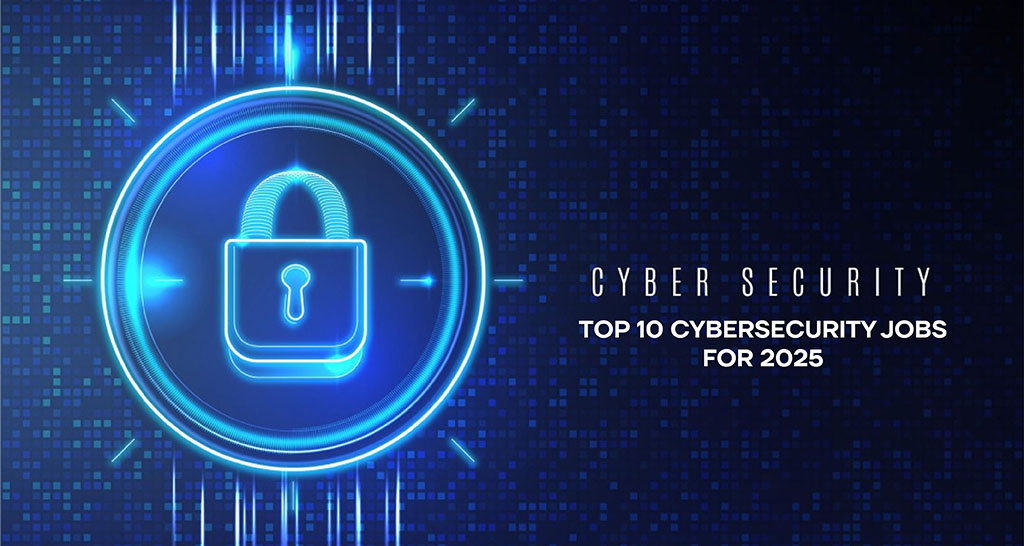The swift growth of the digital landscape has significantly altered various industries, economies, and societal structures. As dependence on technology escalates, so too does the emergence of cyber threats. Professionals in cybersecurity play an essential role in protecting sensitive information and maintaining the integrity of systems, networks, and applications. With the increasing complexity of cyber threats, the need for proficient cybersecurity specialists is surging at an extraordinary pace. The cybersecurity sector is among the most rapidly expanding fields, and this momentum is anticipated to persist through 2025 and beyond.
In this article, we will examine the ten most sought-after cybersecurity positions anticipated for 2025. These roles encompass a range of specializations and experience levels, offering numerous opportunities for individuals at various points in their professional journeys.
- Chief Information Security Officer (CISO)
The Chief Information Security Officer (CISO) holds a prominent position within the cybersecurity domain, tasked with the comprehensive management of an organization’s security framework. CISOs are charged with implementing effective security protocols to safeguard against cyber threats, mitigate risks, and adhere to legal and regulatory standards. As organizations encounter escalating cyber threats, the need for skilled CISOs is on the rise.
In 2025, the responsibilities of a Chief Information Security Officer (CISO) will further develop in response to progress in artificial intelligence and machine learning. The CISO must remain proactive in addressing new threats and incorporate innovative technologies into the security framework of their organization.
Skills Required:
Proficiency in leadership and management capabilities
Comprehensive knowledge of security frameworks
Expertise in risk management
Skills in incident response and crisis management
- Cybersecurity Analyst
Cybersecurity analysts play a crucial role in overseeing and evaluating an organization’s networks, systems, and data to identify potential threats. Their responsibilities include investigating security incidents, implementing protective measures, and safeguarding the overall integrity of the IT infrastructure. With the rise in cyber-attacks, organizations are likely to persist in recruiting cybersecurity analysts to identify and address threats proactively before they develop into more significant issues.
By the year 2025, cybersecurity analysts will be required to attain expertise in AI-based threat detection systems and will possess the capability to analyze extensive datasets to identify anomalies.
Skills Required
Network security and intrusion detection
Proficiency in SIEM tools
Comprehension of malware analysis
Robust problem-solving abilities
- Penetration Tester (Ethical Hacker)
Penetration testers, also known as ethical hackers, are employed by organizations to conduct simulated cyber-attacks on their systems. These assessments are crucial for identifying vulnerabilities prior to their exploitation by malicious hackers. The demand for penetration testing expertise is increasing, particularly as businesses recognize the significance of implementing proactive security strategies.
In 2025, it will be essential for ethical hackers to stay abreast of the continuously changing methods and tools employed by attackers. They will be required to replicate attacks utilizing sophisticated strategies such as social engineering, artificial intelligence-driven exploits, and reconnaissance of the deep web.
Skills Required:
Proficiency in tools for ethical hacking
Understanding of exploit creation and scripting
Acquaintance with web application security measures
Capability to execute social engineering tactics
- Cloud Security Architect
With the increasing migration of organizations’ infrastructure to the cloud, there has been a significant rise in the need for cloud security architects. These experts are responsible for designing and establishing secure cloud environments to safeguard data, applications, and services that are hosted in the cloud. By the year 2025, the escalating use of hybrid and multi-cloud environments will further emphasize the importance of cloud security.
Cloud security architects must possess a comprehensive understanding of cloud platforms such as AWS, Azure, and Google Cloud, as well as the distinct security challenges associated with cloud-based infrastructures.
Skills Required
Proficiency in cloud computing and various cloud service models
Familiarity with cloud security solutions
Evaluation of risks and adherence to compliance standards
Background in encryption and identity management within cloud settings
- Incident Responder
Incident responders serve as the initial defense against cybersecurity breaches. They oversee the response to security incidents, conduct investigations to determine their underlying causes, and implement corrective measures to avert future occurrences. In the rapidly evolving digital landscape of 2025, the role of incident responders will be crucial in mitigating the impact of cyber-attacks.
Responders must not only focus on conventional incident response but also be equipped to address advanced persistent threats (APTs) and ransomware attacks, both of which are anticipated to rise in occurrence.
Skills Required:
Knowledge in incident response methodologies and protocols
Skilled in the use of forensic tools
Experienced in malware analysis and reverse engineering
Possesses strong communication abilities and crisis management expertise
- Security Software Developer
Security software developers are responsible for designing and developing tools and applications that safeguard systems against cyber threats. They construct secure software from the foundational level and incorporate security features into pre-existing applications. As an increasing number of companies emphasize security within their development processes, the demand for security software developers is expected to rise significantly by 2025.
The development of security software must also incorporate DevSecOps practices, guaranteeing that security measures are integrated at each phase of the software lifecycle.
Skills Required:
Proficient in programming abilities
Experience in secure coding methodologies
Understanding of encryption methods
Acquainted with DevSecOps practices and tools
- Security Consultant
Security consultants offer guidance to organizations seeking to enhance their cybersecurity measures. They conduct audits, assess current security protocols, and deliver recommendations aimed at bolstering an organization’s defense strategies. By the year 2025, an increase in regulations pertaining to cybersecurity is expected to drive greater demand for skilled security consultants capable of ensuring compliance and mitigating risks.
Security consultants must remain vigilant in monitoring emerging threats, adapting to regulatory changes, and staying informed about new technologies such as blockchain.
Skills Required:
Familiarity with cybersecurity frameworks and regulatory standards
Proven experience in performing risk assessments and security audits
Specialization in the design of security architecture
Excellent communication and presentation abilities
- Threat Hunter
Threat hunters engage in the proactive identification of potential cyber threats within an organization’s networks and systems. In contrast to cybersecurity analysts, who mainly react to identified threats, threat hunters take the initiative to discover and mitigate threats prior to any damage occurring. By the year 2025, as cyber threats continue to evolve in complexity, threat hunting is expected to emerge as a crucial proactive strategy.
Threat hunters must utilize sophisticated tools such as machine learning and artificial intelligence to detect concealed threats and vulnerabilities.
Skills Required:
Proficiency in utilizing threat-hunting tools and methodologies
In-depth understanding of malware and various attack strategies
Acquainted with network traffic examination and behavioral analysis
Robust investigative and analytical capabilities
- Blockchain Security Expert
Blockchain technology is experiencing swift adoption across various sectors, including finance and supply chain management. With the increasing utilization of blockchain, there is a corresponding demand for specialists in blockchain security. These experts play a crucial role in safeguarding blockchain-based systems and applications, working to thwart threats such as fifty-one percent attacks and double-spending.
By the year 2025, the role of blockchain security specialists will become essential as an increasing number of organizations transition to decentralized applications and digital currencies.
Skills Required:
Comprehensive understanding of blockchain technology and cryptographic principles
Acquaintance with various blockchain platforms
Proficiency in ensuring the security of smart contracts
Awareness of security risks associated with decentralized finance.
- AI/ML Security Engineer
Artificial intelligence and machine learning are revolutionizing the field of cybersecurity through the automation of threat detection and response mechanisms. Security engineers specializing in AI and machine learning are dedicated to designing sophisticated security systems capable of forecasting and recognizing potential threats by employing data-driven algorithms. As the prevalence of AI-driven attacks increases, the demand for AI/ML security engineers will surge, necessitating their expertise in both the development and defense against these complex threats.
In 2025, the importance of AI/ML security engineers will significantly increase as artificial intelligence continues to advance.
Skills Required:
Expertise in artificial intelligence and machine learning algorithms and models
Experience with tools for security automation
Robust programming capabilities
Acquaintance with data analysis and security in big data environments
Conclusion
Cybersecurity represents a rapidly changing and developing sector that expands in tandem with technological progress. As we near the year 2025, the necessity for proficient cybersecurity experts is expected to rise, leading to the creation of new job positions and specializations designed to address the evolving requirements of both businesses and governmental entities. Whether you are a seasoned professional aiming to focus on a different aspect or an individual embarking on your career journey, the cybersecurity field provides a wide array of opportunities for personal and professional development.










